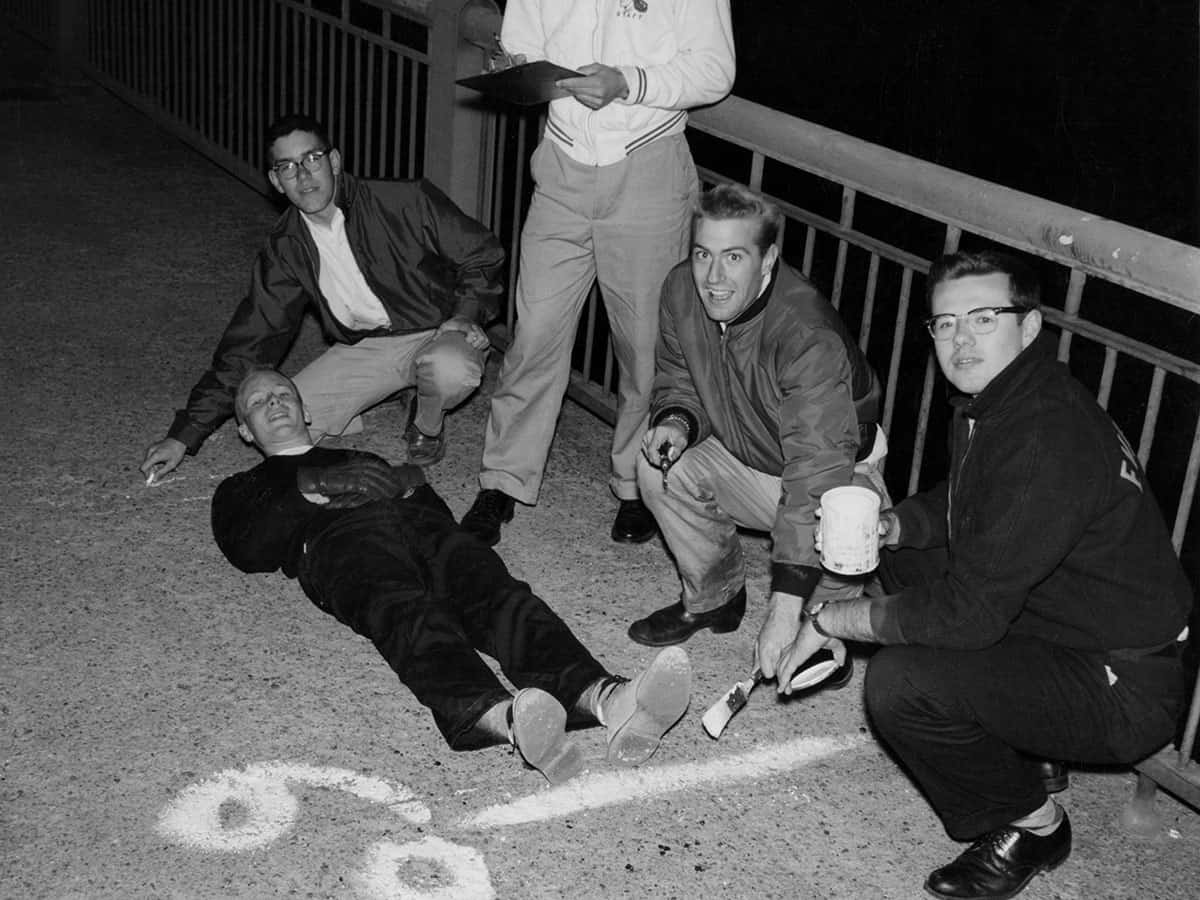SI units are a scientist’s best friend, but there are also some unusual scales of measurement available. Stephen Ornes looks at the stories behind some of the world’s more weird and wonderful units

How much beauty does it take to launch a ship? How much does a male physicist’s beard grow in a second? And what is the optimal length of a lecture? These may not seem like typical phenomena you need to measure, but they’ve nonetheless inspired creative souls to forge new units of measurement.
They are just some of the weird scales that exist in the shadows of the formal SI units and their spin-offs. With the recent redefinition of our beloved kilogram, ampere, kelvin and mole, now is the perfect moment to acknowledge those other units that escape the close scrutiny applied to scientific inquiry. Yes, they may lack the precision of nature’s numbers, such as the Planck constant – the cornerstone of the new kilogram measurement – but they more than make up for that deficiency with grit, character and insight. Or at least funny backstories.
The man is the measure
Oliver R Smoot knows perhaps better than anyone how an unlikely unit of measurement, born in a flash of youthful necessity, can endure over decades. In the autumn of 1958, he was a fresh-faced first-year student at the Massachusetts Institute of Technology (MIT) in Cambridge, US. Smoot had pledged to join the Lambda Chi Alpha fraternity and, as such, was at the mercy of the group’s pledgemaster – an older student charged with delegating ridiculous tasks to new recruits. On a cool October night, the challenge took place on the Harvard Bridge, which spans the Charles River and connects Cambridge with Boston.
The task? Measure the bridge. The ridiculous element? Do it in smoots.
As the shortest “pledge” – 5 feet 7 inches or 1.70 m – Smoot was declared the unit of measurement. He lay down over and over again, his feet picking up where his head had been moments before. The other students marked his progress with chalk and then painted “smoot marks”. The bridge turned out to be about 364.4 smoots long, plus or minus an ear, and the stunt has gone down in history.
“It illustrates how something that can take you an hour and a half when you’re a freshman in college can live to affect your whole life,” Smoot says. “It turned out to be in a good way.”
The next year, the new Lambda Chi Alpha pledges returned to the scene of the smoots and repainted the lines, a practice that grew into an annual tradition and means even today’s visitors to the Harvard Bridge can mark their progress across the river in smoots. Indeed, when the bridge was rebuilt in the 1980s, Smoot says, the project manager was so impressed with the measure that he planned to space the expansion joints by exactly one smoot.

That decade also saw Smoot’s son attend MIT but he declined his dormmates’ passionate exhortations to join them on the bridge and re-measure the bridge in next-generation smoots. Standing at 6 feet 1 inch (1.85 m), this would have led to confusion.
Smoot senior’s original stunt turned out to be predictive of his achievements in later life. After MIT, he went to Georgetown University law school, and then worked on policy issues affecting the computer industry. But in 2001 Smoot was appointed chair of the American National Standards Institute, before becoming the president of the International Organization for Standardization two years later. In other words, Smoot – the man and the measure – eventually led the leading organizations behind setting standards of measurement.
In 2008 Smoot, who now lives in San Diego, returned to campus for the 50th anniversary of that night, during which a plaque was installed on the bridge and the human unit – Oliver himself – was given a “smoot stick” measuring 5 feet 7 inches long.
We know standards change – for example, the International Prototype Kilogram has not kept the same mass over the years – which is one reason why the SI units are being redefined in terms of universal constants. Smoot says that over the years people have asked if he’s lost height and what that would mean for redefining the smoot, but so far it hasn’t happened – he remains 5 feet 7 inches, just like that night in 1958. “I think my mother, who is now 98, is at least four or five inches shorter than she used to be,” he says, “so I guess it will happen. And then we’ll have to go back to the Harvard Bridge and just trust those marks made in 1958.”
The Garn scale
Of all the units to take your name, being the standard for space sickness is probably not top of your wish list. But for Senator Edwin Jacob “Jake” Garn, that would forever be a legacy from his trip into space following anecdotes about him throwing up.
While plenty of astronauts have gone on to have political careers, Garn was the first to go in the opposite direction. Having served as a senator from Utah from 1974 to 1993, Garn was tightly connected to NASA’s finances in his role as the leader of a Senate sub-committee that had to approve the space agency’s budget. But he was also an experienced pilot and, according to Jeff Bingham – once Garn’s chief of staff – the senator opened a meeting with NASA officials with the question: “When do I go?” It sounded like a joke, but it sank in. At a later meeting, NASA’s deputy administrator Hans Mark supported the idea of sending Garn into space: “The whole purpose of the Space Shuttle is to have routine access to space. What better way to demonstrate that than to fly a member of Congress?”
Garn joined a seven-day mission on the NASA Space Shuttle Discovery in April 1985 as a payload specialist. For the mission, he was the subject of medical studies so that scientists could look at the effects of catapulting a body into space.

Despite his previous experience as a pilot, anecdotes about his training inspired a new unit of measurement for nausea. “Garn represents the maximum level of space sickness that anyone can ever attain, and so the mark of being totally sick and incompetent is one garn,” recalled the late Bob Stevenson – an oceanographer who taught astronauts – in an oral history interview for NASA’s Johnson Space Center. “Most guys will get maybe to a tenth [of a] garn, if that high.”
The “Garn scale” quickly gained momentum as a measure of how sick a person became during spaceflight, though its application isn’t standardized. Some, like Stevenson, characterized it as a measure between 0 and 1. Others refer to it as a scale from 1 to 10. A month after that Discovery mission, a biochemist studying how some test animals had fared on another space voyage told The New York Times that some squirrel monkeys were “two garns”. What he meant was that the critters were pretty sick, but they could have been sicker.
Garn himself has always maintained a sense of humour about the metric. He has acknowledged that just being able to report a Garn scale showed that a person had experienced an adventure unlike any other. “And believe me, I’d throw up every day just to go into space again,” he said in a 2005 interview.
Erdős–Bacon number
The title of Paul Hoffman’s 1998 biography of Paul Erdős called the Hungarian-born mathematician “the man who loved only numbers”. Erdős, who as a student declared prime numbers his best friends, was phenomenally prolific and a titan of 20th century mathematics. “If numbers aren’t beautiful,” he liked to say, “I don’t know what is.” During his lifetime, fuelled by coffee and amphetamines, he published about 1500 papers, and roughly half of those were in the field of number theory. After his death in 1996, his former student Carl Pomerance, then a mathematician at the University of Georgia in the US, called him a “kind and generous man, one who would seek out young mathematicians, work with them, give them ideas, teach them, and in the process make a lifelong friend and colleague”.
You could argue that Erdős treated mathematics as a social event; during his career he collaborated with more than 500 other mathematicians. The importance of his contributions, combined with his vast network of collaborators, gave rise to a prestigious unit of measurement: the Erdős number. A person’s Erdős number is a status symbol. It represents the number of “steps” – measured by collaborations through published papers – that connect a mathematician to Erdős. Each of his 509 collaborators, for example, has an Erdős number of 1. Albert Einstein published a paper with Ernst Gabor Straus in 1945, and Straus published a paper with Erdős in 1953. That means Einstein’s Erdős number is 2. Meanwhile, Stephen Hawking’s is 4 and Marie Curie’s is 7.
However, you can do more with your Erdős number, and a select few have. It requires going to Hollywood. Forget the Oscars; among some actors, one unit of prestige is their Bacon number. This represents how many “steps” – measured by collaborations in feature films – connect the actors to Kevin Bacon, who has starred in many films and TV shows including Footloose, Tremors and Apollo 13.

In the 1990s three college students introduced a party game called “Six Degrees of Kevin Bacon”, in which players connect actors to Bacon through mutual appearances in movies, not unlike the way mathematicians are connected to Erdős. Julia Roberts starred with Kevin Bacon in the 1990 movie Flatliners, which means she has a Bacon number of 1. Physicist Neil deGrasse Tyson voiced a character in 2016’s Ice Age: Collision Course, which also starred Queen Latifah, who was in the 2005 film Beauty Shop with Kevin Bacon. That means deGrasse Tyson’s Bacon number is 2.
There exists a small set of people in the world who have both Erdős numbers and Bacon numbers, which can be conveniently combined into Erdős–Bacon numbers. That is, they can connect to Kevin Bacon through their filmography, and connect to Paul Erdős through their publication history. The actress Natalie Portman, for example, earned an Erdős number of 5 through a research paper she co-authored while a student at Harvard, and a Bacon number of 2 through her film career (she was in Mars Attacks! in 1996 with Jack Nicholson, who starred with Kevin Bacon in A Few Good Men in 1992). Her Erdős–Bacon number is therefore 7. Carl Sagan’s Erdős–Bacon number is 6.
Not to be left out, Erdős himself, because he appeared in a documentary about his life, has an Erdős–Bacon number of 3. Kevin Bacon, as far as we know, does not have an Erdős–Bacon number. Time for him to take up some mathematics, I think.
Banana equivalent dose
When it comes to measuring the amount of ionizing radiation we absorb, we have many tools to choose from. We can measure in sieverts, rads, curies, grays – and even bananas. “Some time ago (when I almost had time to do such things) I calculated the dose one receives from the average banana,” begins a legendary 1995 note from Gary Mansfield, a health physicist at the Lawrence Livermore National Laboratory in the US, who has since retired. Marshall sent the note to the lab’s RADSAFE electronic bulletin board.
“As best as I can remember, my intent on ‘cooking up’ this new unit was to emphasize that people were getting all worked up about truly trivial doses of radiation,” he says. “And the BED [banana equivalent dose] seemed to be a good way of doing that.”

Translating units of radiation to the general public can be a tricky art for scientists. A sievert (Sv) is a dose of radiation equal to one joule of energy per kilogram of mass. There’s a natural background of about 10 μSv that an average person receives in one day, and a flight from New York to Los Angeles brings an exposure of about 40 μSv. An exposure of 1 Sv causes symptoms of radiation poisoning, such as nausea and vomiting. Studies suggest, however, that receiving a massive dose all at once is much more dangerous than receiving the same amount over a long time period.
Many foods contain radioactive elements that emit radiation. Bananas contain potassium-40 (40K), a naturally occurring isotope and Mansfield found in a radiation reference manual that they have a 40K concentration of about 3520 picocuries per kilogram. Assuming that an average banana has a mass of about 150 g, he calculated the ionizing radiation from a banana at 5.28 × 10–4 microcuries, or about 0.1 μSv.
Mansfield wrote that BED gave him a useful way to talk to the public about everyday minuscule doses – and their minuscule risks. Critics of the BED have, however, noted that the human body naturally maintains a fairly steady concentration of potassium, so eating bananas won’t cause an accumulation.
Looking back, Mansfield acknowledges that the critics have a point, and the idea of getting additional radiation from eating lots of bananas is probably inaccurate. “However, I think I would still argue that if bananas are part of one’s normal diet, the 40K in those bananas does contribute to one’s annual dose from 40K,” he says – even if the radiation doses in the range of a banana are “truly trivial”, and not worth worrying about.
Mansfield ended his original 1995 post to the RADSAFE bulletin board with a stern warning: “Considering the fact that the DOE [Department of Energy] has officially stated that ‘there is no safe dose of radiation’, my advice to you all is to stop eating immediately.”
Ships, beards and lectures
So what about our ship-launching beauty, beard growth and perfect lectures? According to the biochemist and science-fiction writer Isaac Asimov, it takes a “millihelen” of beauty to launch one ship – in honour of Helen of Troy (of The Iliad, The Odyssey and The Aeneid) who was famously described in a 17th-century play as having a “face that launch’d a thousand ships”. An article in the Journal of Irreproducible Results, a science humour magazine, once estimated that in one second, a male physicist’s beard grows about 5 nm and defined that as a “beard-second”. And finally, mathematician John von Neumann allegedly proposed that the optimal length of a lecture is one “microcentury”, which comes out to about 52 minutes, 34 seconds – as long as you ignore leap years.
I’m sure I’ve missed some of your favourite strange units. If so, do let the editors of Physics World know. I’m off to measure my beard.




